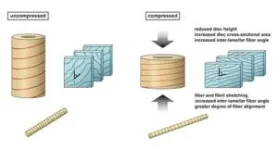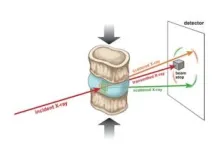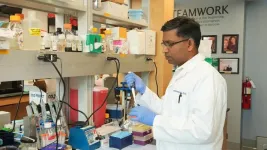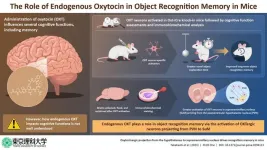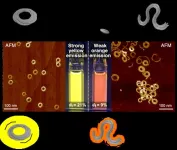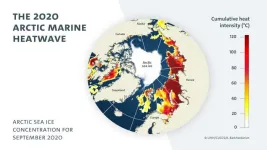(Press-News.org) The National Foundation for Cancer Research (NFCR) proudly celebrates the outstanding contributions of Dr. Yung-Chi Cheng, the Henry Bronson Professor of Pharmacology and Medicine at Yale University. Dr. Cheng's relentless dedication over the past three decades has led to an experimental botanical drug, YIV-906, to enter various phase II human trials and establishing a now clinical-stage platform biotechnology company committed to developing groundbreaking medicines targeting cancer and aging-related diseases.
NFCR has been a vital and steadfast supporter of Dr. Cheng's pioneering work, providing more than $2.5 MM since 1991 for academic grant funding and seed investments to advance his research endeavors and launch YIV-906. This sustained support has enabled Dr. Cheng to push the boundaries of cancer research and lay the foundation for Yiviva's transformative work.
Dr. Cheng's lab is taking a systems biology approach to treating cancer and has developed an experimental botanical drug, YIV-906, that could improve cancer treatment. This new agent was inspired by an ancient botanical medicine. Early testing shows that YIV-906 helps boost the body's own immune response against tumors by acting as an immunomodulator in the tumor microenvironment and enhancing innate and adaptive immunity. YIV-906 also helps to shield the digestive system from the harsh side effects of other cancer drugs by cytoprotecting the gastrointestinal tract. Yiviva is now studying YIV-906 in a randomized, placebo-controlled trial for liver cancer patients who have hepatitis B. In this phase IIb study, patients take YIV-906 together with the drug sorafenib, which attacks tumors directly.
In addition, YIV-906 could increase the therapeutic index for a broad spectrum of cancer regimens, including chemotherapy, immunotherapy, and/or radiation, to treat solid tumors - including liver, pancreatic, colorectal, rectal, non-small cell lung cancer and melanoma. Initial clinical results demonstrate how YIV-906 enhances the efficacy and improves the safety of other treatments by acting as an immunomodulator in the tumor microenvironment and cytoprotector in the gastrointestinal tract. YIV-906 primes the tumor microenvironment and then enhances both innate and adaptive immunity to attack the cancer cells. By leveraging the polychemical nature of medicinal plants and their ability to target multiple sites, this first-of-its-kind agent takes a promising scientific approach to adjuvant cancer care. Yiviva aims to improve cancer patient outcomes by developing YIV-906 as a natural booster to standard medical therapies that prolongs survival and improves quality of life.
A Multi-National Company, AstraZeneca China, has partnered with Dr. Cheng and his collaborator Yiviva to develop systems biology platforms and innovative botanical medicines to address global unmet medical needs. Together, they aim to accelerate drug discovery by gaining insights from experience-based, traditional botanical medication through cutting-edge science.
This approach perfectly fits Dr. Cheng's vision of fusing Western and Eastern approaches into "WE Medicine." It brings together the best of both worlds. Scientists from this partnership will study medicinal plants and design multi-targeted drugs. They hope to develop evidence treatments that treat patients holistically by teaming together. This blending of ancient wisdom and futuristic methods has great promise to address diseases impacting people globally.
NFCR congratulates Dr. Cheng and his collaborators on this remarkable recognition. "Dr. Yung-Chi Cheng's achievements are a testament to the impact of sustained support for innovative research. NFCR is proud to have played a role in supporting his groundbreaking work, and we are excited to see Dr. Cheng's strategic collaboration with AstraZeneca because of this collective effort," said Dr. Sujuan Ba, President and CEO of the National Foundation for Cancer Research.
Dr. Yung-Chi Cheng, the Henry Bronson Professor of Pharmacology and Medicine at Yale University, expressed gratitude for the enduring support from NFCR, stating, "The contributions from NFCR have been instrumental in propelling our mission forward. With this continued support, we look forward to advancing our pipeline of innovative medicines to benefit patients worldwide."
About NFCR:
The National Foundation for Cancer Research (NFCR) is a 501(c)(3) nonprofit organization that provides scientists in the lab the funding they need to make game-changing discoveries in cancer treatments, detection, prevention and ultimately, a cure. NFCR has distinguished itself in the cancer research sector by emphasizing long-term, transformative research often overlooked by other major funding sources. With the help of more than 5.3 million individual donors over the last 50 years, NFCR has provided $410 million in funding to cancer research, prevention, and public education leading to some of the important, life-saving discoveries that benefit patients today. For more information about NFCR and its mission, please visit www.nfcr.org.
END
National Foundation for Cancer Research (NFCR) celebrates Dr. Yung-Chi Cheng's three decades of pioneering research and recent partnership with Astrazeneca China
2024-02-13
ELSE PRESS RELEASES FROM THIS DATE:
Sandalwood oil by-product prevents prostate cancer development in mice
2024-02-13
Extracted from the core of sandalwood trees (santalum album tree), sandalwood oil has been used for many centuries by several cultures throughout the world for perfume, soaps, incense and candles. With its earthy sweet scent, this essential oil also is used in the food industry and topically in various cosmetic preparations.
Importantly, this natural oil is known for its health benefits and medicinal applications from antibacterial to anticancer because of its phytochemical constituents. In addition to containing esters, free acids, aldehydes, ketones and santenone, sandalwood oil primarily (90 percent or more) constitutes santalol – ...
Low-cost microbe can speed biological discovery
2024-02-13
UNDER EMBARGO UNTIL 8AM EST ON FEB. 13, 2024
ITHACA, N.Y. – Cornell University researchers have created a new version of a microbe to compete economically with E. coli – a bacteria commonly used as a research tool due to its ability to synthesize proteins – to conduct low-cost and scalable synthetic biological experiments.
As an inexpensive multiplier – much like having a photocopier in a test tube – the bacteria Vibrio natriegens could help labs test protein variants for creation of pharmaceuticals, synthetic fuels and sustainable compounds that battle weeds or pests. The microbe can work effectively without costly incubators, shakers or deep freezers ...
Determining who gets blamed when cars hit pedestrians
2024-02-13
COLUMBUS, Ohio – A new study examines the circumstances behind who is found at fault when cars hit pedestrians in an urban area.
Results showed that the environment where the crash took place – especially the types of roads and the amount of access to marked crosswalks – played a key role in whether the pedestrian or the driver was blamed for the collision.
In the study, done in Columbus, pedestrians were more likely to be blamed when they were crossing roads with a high volume of cars traveling at faster speeds, and where crosswalks were few and far between.
In areas of the city – such as downtown – ...
Oxytocin: the love hormone that holds the key to better memory
2024-02-13
Oxytocin (OXT) is a hormone that is known for its effects on psychological well-being and emotional bonding in animals. Interestingly, research has shown that this natural chemical in the brain plays a crucial role in other cognitive processes as well, including learning and memory. Now, scientists may have discovered exactly how OXT influences memory in animals by studying “OXT neurons” that contain OXT receptors and function differently based on the availability of the chemical in the brain.
In a recent study published on 16 November 2023, in PLOS One, a group ...
Exploring the effect of ring closing on fluorescence of supramolecular polymers
2024-02-13
In supramolecular chemistry, the self-assembly state of molecules plays a significant role in determining their tangible properties. Controlling the self-assembled state has garnered significant attention as it can be exploited to design materials with desired properties like charge transport capability and fluorescence wavelength. For years, scientists have been trying to decipher how molecular organization impacts the properties of supramolecular assemblies that are in the nano (<10 nm) and mesoscopic (10–1000 nm) scales. However, the study of structures with supramolecular polymer assemblies derived from the same monomer is often hindered by dynamic structural ...
Frequent marine heatwaves in the Arctic Ocean will be the norm
2024-02-13
Marine heatwaves will become a regular occurrence in the Arctic in the near future and are a product of higher anthropogenic greenhouse-gas emissions – as shown in a study just released by Dr. Armineh Barkhordarian from Universität Hamburg’s Cluster of Excellence for climate research CLICCS.
Since 2007, conditions in the Arctic have shifted, as confirmed by data recently published in the journal Nature Communications Earth & Environment. Between 2007 and 2021, the marginal zones ...
Greenland’s ice sheet is melting - and being replaced by vegetation
2024-02-13
University of Leeds Press Release
Under embargo until 10:00 GMT on 13 February
There are graphics and photographic images that help explain this story – see under Note to editors
Greenland’s ice sheet is melting - and being replaced by vegetation
An estimated 11,000 sq miles or 28,707 sq kilometres of Greenland’s ice sheet and glaciers have melted over the last three decades, according to a major analysis of historic satellite records.
The total area of ice loss is equivalent to the size of Albania, and represents about 1.6 % of Greenland’s ...
New Durham University research opens avenues for more efficient and stable blue OLED displays
2024-02-13
-With pictures-
A new research from scientists at Durham University reveals an unexpected pathway towards brighter, more efficient, and more stable blue organic light-emitting diodes (OLEDs).
The findings, published in the journal Nature Photonics could help enable the next generation of energy-saving display technologies.
OLED displays, used in most modern smartphones and TVs, rely on light emission from specialised organic molecules.
Obtaining stable, efficient blue emission suitable for displays remains a key challenge.
Now, Durham ...
Study finds childhood bullying linked to distrust and mental health problems in adolescence
2024-02-13
A new study, co-led by UCLA Health and the University of Glasgow, found that young teenagers who develop a strong distrust of other people as a result of childhood bullying are substantially more likely to have significant mental health problems as they enter adulthood compared to those who do not develop interpersonal trust issues.
The study, published in the journal Nature Mental Health on Feb. 13, is believed to be the first to examine the link between peer bullying, interpersonal distrust, and the subsequent development of mental health problems, such as anxiety, depression, hyperactivity and anger.
Researchers ...
Compounds released by bleaching reefs promote bacteria, potentially stressing coral further
2024-02-13
On healthy reefs around the world, corals, algae, fishes and microbes live interconnected and in balance—exchanging nutrients, resources, and chemical signals. New research led by the University of Hawai‘i (UH) at Mānoa and and the Royal Netherlands Institute for Sea Research (NIOZ) revealed that when coral bleaching occurs, corals release unique organic compounds into the surrounding water that not only promote bacterial growth overall, but select for opportunistic bacteria that may further stress reefs.
“Our results demonstrate how the impacts of both short-term thermal ...

